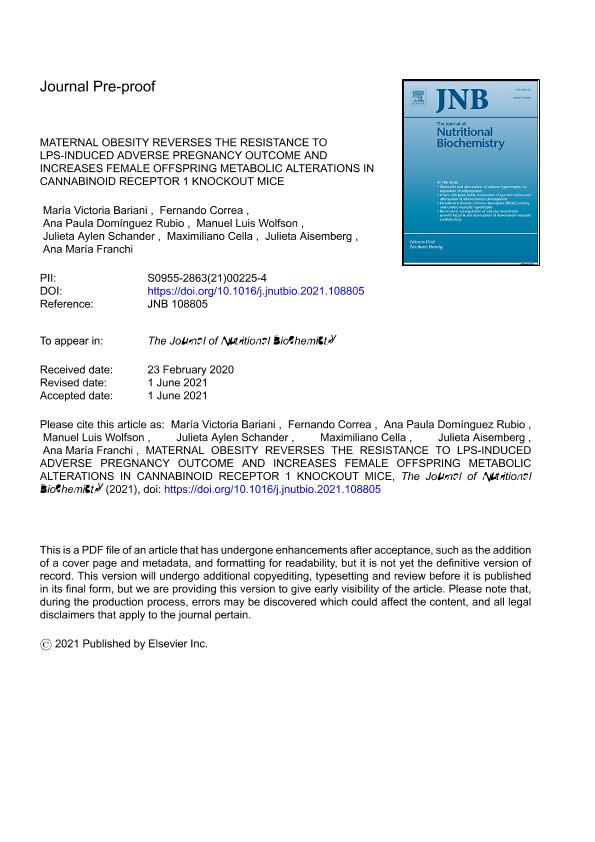Artículo
Maternal obesity reverses the resistance to LPS-induced adverse pregnancy outcome and increases female offspring metabolic alterations in cannabinoid receptor 1 knockout mice
Bariani, Maria Victoria ; Correa, Fernando Gabriel
; Correa, Fernando Gabriel ; Domínguez Rubio, Ana Paula
; Domínguez Rubio, Ana Paula ; Wolfson, Manuel Luis
; Wolfson, Manuel Luis ; Schander, Julieta Aylen
; Schander, Julieta Aylen ; Cella, Maximiliano
; Cella, Maximiliano ; Aisemberg, Julieta
; Aisemberg, Julieta ; Franchi, Ana Maria
; Franchi, Ana Maria
 ; Correa, Fernando Gabriel
; Correa, Fernando Gabriel ; Domínguez Rubio, Ana Paula
; Domínguez Rubio, Ana Paula ; Wolfson, Manuel Luis
; Wolfson, Manuel Luis ; Schander, Julieta Aylen
; Schander, Julieta Aylen ; Cella, Maximiliano
; Cella, Maximiliano ; Aisemberg, Julieta
; Aisemberg, Julieta ; Franchi, Ana Maria
; Franchi, Ana Maria
Fecha de publicación:
06/2021
Editorial:
Elsevier Science Inc.
Revista:
Journal of Nutritional Biochemistry
ISSN:
0955-2863
Idioma:
Inglés
Tipo de recurso:
Artículo publicado
Clasificación temática:
Resumen
Maternal overnutrition negatively impacts the offspring's health leading to an increased risk of developing chronic diseases or metabolic syndrome in adulthood. What we eat affects the endocannabinoid system (eCS) activity, which in turn modulates lipogenesis and fatty acids utilization in hepatic, muscle, and adipose tissues. This study aimed to evaluate the transgenerational effect of maternal obesity on cannabinoid receptor 1 knock-out (CB1 KO) animals in combination with a postnatal obesogenic diet on the development of metabolic disturbances on their offspring. CB1 KO mice were fed a control diet (CD) or a high-fat diet (HFD; 33% more energy from fat) for 3 months. Offspring born to control and obese mothers were also fed with CD or HFD. We observed that pups born to an HFD-fed mother presented higher postnatal weight, lower hepatic fatty acid amide hydrolase activity, and increased blood cholesterol levels when compared to the offspring born to CD-fed mothers. When female mice born to HFD-fed CB1 KO mothers were exposed to an HFD, they gained more weight, presented elevated blood cholesterol levels, and more abdominal adipose tissue accumulation than control-fed adult offspring. The eCS is involved in several reproductive physiological processes. Interestingly, we showed that CB1 KO mice in gestational day 15 presented resistance to LPS-induced deleterious effects on pregnancy outcome, which was overcome when these mice were obese. Our results suggest that an HFD in CB1 receptor-deficient mice contributes to a “nutritional programming” of the offspring resulting in increased susceptibility to metabolic challenges both perinatally and during adulthood.
Palabras clave:
CB1 KO MICE
,
HIGH-FAT DIET
,
MATERNAL OBESITY
,
NUTRITIONAL PROGRAMMING
Archivos asociados
Licencia
Identificadores
Colecciones
Articulos(CEFYBO)
Articulos de CENTRO DE ESTUDIOS FARMACOLOGICOS Y BOTANICOS
Articulos de CENTRO DE ESTUDIOS FARMACOLOGICOS Y BOTANICOS
Articulos(IQUIBICEN)
Articulos de INSTITUTO DE QUIMICA BIOLOGICA DE LA FACULTAD DE CS. EXACTAS Y NATURALES
Articulos de INSTITUTO DE QUIMICA BIOLOGICA DE LA FACULTAD DE CS. EXACTAS Y NATURALES
Citación
Bariani, Maria Victoria; Correa, Fernando Gabriel; Domínguez Rubio, Ana Paula; Wolfson, Manuel Luis; Schander, Julieta Aylen; et al.; Maternal obesity reverses the resistance to LPS-induced adverse pregnancy outcome and increases female offspring metabolic alterations in cannabinoid receptor 1 knockout mice; Elsevier Science Inc.; Journal of Nutritional Biochemistry; 96; 6-2021; 1-38
Compartir
Altmétricas



